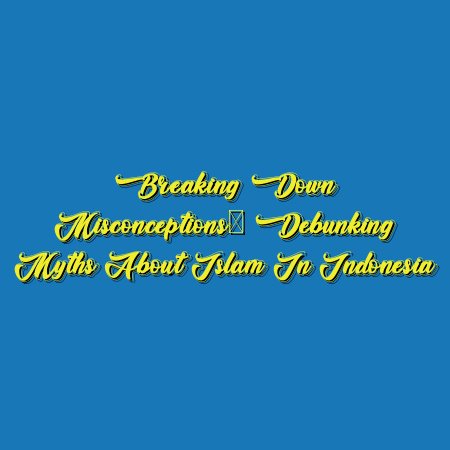Daftar isi
Breaking Down Misconceptions: Debunking Myths About Islam in Indonesia – Hello, Sobat Majikan! Selamat datang di Artikel ini yang akan membahas tentang mengurai kesalahpahaman dan mengungkap mitos tentang Islam di Indonesia. Dalam beberapa tahun terakhir, Islam seringkali dikaitkan dengan berbagai isu negatif seperti terorisme, intoleransi, dan pelanggaran hak asasi manusia. Namun, penting bagi kita untuk menghentikan penyebaran pemikiran negatif ini dan mulai memahami Islam di Indonesia dengan lebih baik. Melalui Artikel ini, kita akan mencoba untuk menguraikan beberapa kesalahpahaman umum dan mengungkap kebenaran tentang Islam di Indonesia. Jadi, mari kita simak dan baca Artikel ini hingga selesai untuk mendapatkan pemahaman yang lebih baik tentang Islam di Indonesia.
Misconception 1: Islam in Indonesia is Monolithic
There is a common misconception that Islam in Indonesia is a monolithic entity, with all Muslims practicing the religion in the same way. However, this is far from the truth. Indonesia is home to the world’s largest Muslim population, and the diversity within this population is vast.
Indonesia is a country with more than 17,000 islands and over 300 ethnic groups. Each of these groups has its own distinct culture, traditions, and interpretations of Islam. For example, in the province of Aceh, where Islam has a strong influence, the people practice a stricter form of Islam compared to other regions.
Furthermore, Indonesia has a long history of syncretism, where Islamic beliefs and practices are combined with local traditions and customs. This has led to the development of unique Islamic practices in different regions of the country.
Case Study: Islam in Java
Java, the most populous island in Indonesia, is a prime example of the diversity within Islam in the country. In Java, Islam is often intertwined with Javanese culture and traditions. The practice of kejawen, a blend of Islam, Hinduism, Buddhism, and Javanese mysticism, is prevalent among the Javanese Muslims.
Kejawen emphasizes spiritual beliefs and practices, and it is not uncommon to find Javanese Muslims who visit spiritual leaders or seek guidance from supernatural entities alongside their regular Islamic rituals. This syncretism is deeply rooted in Javanese culture and is embraced by many Muslims in the region.
Misconception 2: Islam in Indonesia is a Threat to Religious Pluralism
Another misconception about Islam in Indonesia is that it poses a threat to religious pluralism. However, the reality is quite the opposite. Indonesia has a long history of religious tolerance and coexistence.
While Islam is the predominant religion in the country, the Indonesian Constitution guarantees freedom of religion for all its citizens. The Pancasila, the official philosophical foundation of the Indonesian state, upholds the principles of religious diversity and harmony.
Indonesia is home to not only Muslims but also Christians, Hindus, Buddhists, and various indigenous religions. Interfaith marriages, friendships, and collaborations are common, promoting understanding and respect among different religious communities.
Example: The Interfaith Movement in Indonesia
The Interfaith Harmony Forum (FKUB) in Indonesia is an excellent example of efforts to promote religious pluralism and mutual respect. The FKUB consists of religious leaders from different faiths who work together to address interfaith issues and promote dialogue among different religious communities.
Through the FKUB, religious leaders organize interfaith gatherings, seminars, and workshops to foster understanding and cooperation. They also collaborate on social initiatives, such as disaster relief efforts, to demonstrate the shared values of compassion and humanity.
Misconception 3: Indonesian Muslims are Prone to Radicalization
There is a misconception that Indonesian Muslims are more susceptible to radicalization compared to Muslims in other countries. However, research and statistics indicate otherwise.
According to a study by the Institute for Policy Analysis of Conflict (IPAC), the number of Indonesians joining extremist groups is relatively small compared to the total Muslim population. The study also found that the majority of Indonesians reject violence and extremism.
The Indonesian government has implemented various measures to counter radicalization and promote moderate Islam. The Nahdlatul Ulama (NU), one of the largest Islamic organizations in Indonesia, actively works to combat radical ideologies and promote a peaceful interpretation of Islam.
Statistics: Attitudes towards Extremism in Indonesia
- A survey conducted by the Institute of Islamic Studies at the University of Notre Dame found that 95% of Indonesian Muslims rejected the use of violence in the name of Islam.
- According to the Pew Research Center, only 9% of Indonesian Muslims expressed support for ISIS in 2014, while 87% had an unfavorable view of the extremist group.
- The Indonesian government’s counterterrorism efforts have been successful in reducing terrorist attacks in recent years. According to the Global Terrorism Index, the number of deaths from terrorism in Indonesia decreased by 63% between 2023 and 2023.
Summary
Breaking down misconceptions about Islam in Indonesia is crucial for promoting understanding and dispelling stereotypes. Islam in Indonesia is diverse, with different interpretations and practices across the archipelago. The country’s commitment to religious pluralism and the efforts of organizations like the FKUB demonstrate the harmony among different religious communities. Furthermore, statistics show that the majority of Indonesian Muslims reject violence and extremism. By debunking these misconceptions, we can foster a more accurate and nuanced understanding of Islam in Indonesia.
Dalam rangka memahami dan menghormati keberagaman agama di Indonesia, penting bagi kita untuk menghilangkan kesalahpahaman yang ada tentang Islam. Dalam Artikel ini, kami telah membahas dan membantah beberapa mitos yang seringkali dikaitkan dengan agama Islam di Indonesia. Dengan pemahaman yang lebih baik tentang agama ini, kita dapat membangun kedamaian dan toleransi di tengah masyarakat yang beragam. Teruslah membaca Artikel menarik lainnya untuk memperluas pengetahuan kita tentang berbagai topik yang menarik dan relevan. Sampai jumpa kembali!
#Breaking #Misconceptions #Debunking #Myths #Islam #Indonesia Majikan pulsa Breaking Down Misconceptions: Debunking Myths About Islam in Indonesia
